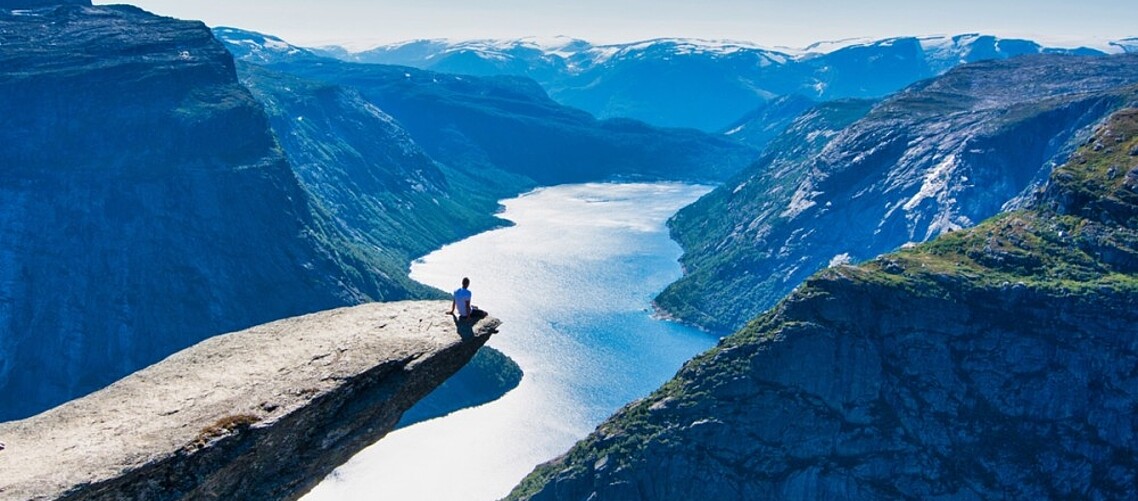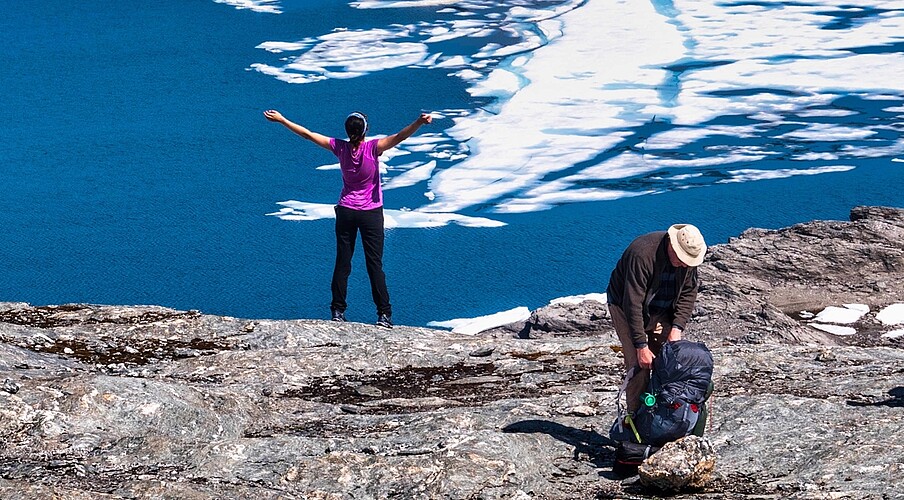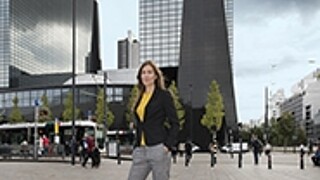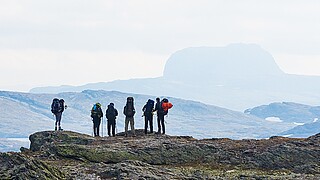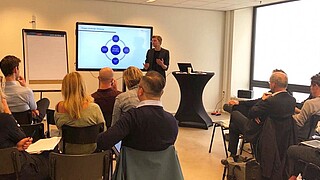A few days into RSM’s Nordic Leadership Expedition to Hardangervidda National Park, Dorothy Seguy (Executive MBA, 2018) had her lightbulb moment. It was her turn to lead, and having failed to set out clear goals, some of her team members were beginning to question her decisions.
“Frankly I was just there to escape the pressure of a hectic work-life balance. That day, I couldn’t care less how many kilometres we walked or whether we reached our end-point or not.” But while she was happy simply walking all day, her followers were not.
“I realised that the others needed goals, and they were angry with me because, without those goals, they felt lost. It was a terrific learning experience, because being a leader isn’t something you are taught in class – it just doesn’t happen that way.”
Strange place for a speech
Seguy is one of several participants who, over the past two years, have braved the RSM expedition to Hardangervidda, the largest eroded plain in Europe and an ancient, ice-worn place. A lunar landscape of rock and rivers, the treeless plateau is vast and – apart from the reindeer herds that nibble its moss and lichen – utterly empty. And, as Verena Ohms (Executive MBA, 2018) discovered, standing on a rocky spur overlooking a Norwegian fjord is a strange place to give a speech.
If you don’t count the wild reindeer, the audience is tiny: just a handful of fellow MBA peers and two or three staff from RSM with whom you’ve spent the past seven days walking and talking, coming undone and rebuilding yourself from the inside out. But the vision speech is the culmination of the expedition. As the wind whisks away your words, it’s a rare opportunity to articulate where you have come from and where you’re going, a promise you make to those who have shared an important part of the journey and, for some, a profoundly personal experience.
“Giving mine and listening to the others was really moving,” says Ohms, who now works at the Erasmus Centre for Leadership. “My speech was extremely personal and I opted not to have it recorded, so what I said is something that will stay within the group and in that wilderness.”
A personal experience
RSM’s Dr Hannes Leroy leads the expedition, and says the first thing he always says to participants is: “It’s not for everyone, it’s quite a challenge.” As well as gale-force winds and the odd snowstorm, last year’s group faced an additional battle to protect their tents from a deluge. “After a long day’s hike, we set up camp and it started to rain,” he recalls. “Overnight, a river began to form so we had to get up in the middle of the night and dig trenches to divert the water away from our tents.”
While Leroy and his colleagues (including partners Bold Expeditions) are on hand to ensure participants’ safety, both physical and mental, they are otherwise alone: they set their own goals, find their own route, and learn about leadership and themselves along the way. The only fixed points are the legacy speech, being leader for a day and taking along a bundle of personal letters from colleagues, friends and family that RSM gathers in advance for each participant.
Failing miserably
“All that’s set is point A, where they enter the national park, and point B, where they leave. Everyone makes their own expedition,” says Dr Leroy. Some opt to set up base camp and explore one area, some set their sights on Hårteigen, a monolith that rises from the plateau like Australia’s Uluru, others bring a pack raft and take to the lakes.
“We tell them how to do it, but other than that it’s up to them. And sometimes they fail miserably,” he explains. “We could be walking in completely the wrong direction for hours, but we let them, because lots of interesting learning arises from that and it builds their self-efficacy.”
Overcoming a lousy leadership day is something Ohms remembers vividly. Her team had set Hårteigen as their objective, but after two days and 20 hours’ walking the mountain remained resolutely out of sight.
Powerful learning environment
“Leading that day was challenging for me because things were really uncertain. Every time we crested a ridge we thought we’d see it – but we never did,” she says. “I hadn’t found my rhythm and was doing a really poor job. I didn’t know what was expected; I was trying to be someone I wasn’t, and it didn’t feel good, so I was disappointed in myself that day,” Ohms said.
However, two things helped her: getting her first glimpse of the mountain that evening and reading a letter from a friend who always made her laugh. “When we finally spotted Hårteigen, sitting there in the distance, it boosted our morale and gave us a new spirit. The next day was special. We got caught in a huge thunderstorm but were determined to reach it, and when we did, we felt euphoric. For the last kilometre we were almost running!”
Exactly what makes the RSM expedition such a powerful learning environment is something Wouter den Boer (Executive MBA, 2018) has thought long and hard about. Like Ohms and Seguy, he studied alongside a full-time job in the aviation industry and believes that it’s the time and space – increasingly rare commodities in modern life – that make it special.
Nowhere to hide
Being outdoors in a small group has two massive benefits, Den Boer believes. First, it creates strong bonds between team members and a safe place to learn. “What happens on those expeditions stays there. People say some very personal – and powerful – things that none of us would ever repeat,” he says. “It was a very trustful environment to give open and honest feedback.
Second are the physical demands. Being active all day provides time and space for thinking and talking, and strips people back to more authentic versions of themselves, he says. “You’re there for a full week, 24/7, so you see everyone’s ups and downs. When you’re under physical stress and strain, leadership style comes to the surface: you find what style fits you best, where you can add value and what you might need to work on. Those moments – when you get feedback with real-life examples – were really useful for me.”
A magical combination
They are things that Leroy says are supported by research evidence as well as his personal experience. A study by one of his current PhD students suggests that people learn most from negative experiences, but only if they have enough room to process their emotions. “It’s exactly what we do in Norway,” Leroy explains. “We put people in uncomfortable positions but give them a wealth of time – either walking by themselves or talking to a coach – to reflect. That’s the magical combination that happens there.”
And because the expedition provides nowhere to hide, it strips people of the many roles and identities they create in normal life. “Out there, you can’t retreat to your cosy hotel room after faking it all day. You have to be yourself from day one. You all sleep in the same tents, you all smell, you all show a vulnerable, human side, so the true self emerges very quickly. We get to the core of who we are – our strengths and our weaknesses – and then get to rebuild a more authentic version of ourselves. That’s what people take away.”
Relax and focus
It’s certainly true for Ohms, Seguy and Den Boer, for whom the experience has been revelatory. For Den Boer, the expedition has boosted his confidence at work and as a leader, and has helped him relax and focus on what’s important to him. “Those are the big wins,” he says. “The letters I read there were particularly powerful, because they all focused on finding a better work-life balance. I’m someone who goes at things full throttle and can lose track of when is a good time to relax. When even your boss tells you this, it’s time to listen.”
Ohms says she returned from Norway more confident and more resilient. There, she says, it was easier to absorb – and process – uncomfortable truths, and it gave her valuable new perspectives. “It made me realise how small we are in this vast universe; problems that seem huge in everyday life suddenly disappeared in Norway. The most important thing when you’re hiking is what you’re going to have for dinner – what’s the dried reindeer stew going to taste like, and does anyone have some dried sausage? There, those are the important questions. And it’s good to find so much joy in such small things.”
Dreams and desires
But Seguy, perhaps, has changed most as a result of the expedition. On returning from Norway she left her job, moved to Amsterdam and is now taking a sabbatical to decide what she really wants to do with her life. Over the space of a week in Norway, spending time with herself as well as listening to others, she says she felt naked and – as a result – better able to reconnect with earlier dreams and desires that gradually got buried by the demands of successive jobs.
If there was a moment of realisation, it was when she gave her legacy speech. “At the age of 20, you want to change the world. Giving my speech made me realise that I still do,” she says.
“When I was young, I wanted to teach, and now I’m making small steps towards that. I’m reconnecting with my roots, it’s like a homecoming. And I made a promise to my team that I would do it, so that’s a commitment I need to keep. Because when you make a promise to an audience after sharing that kind of experience – that really counts for something.”
RSM’s Leadership Expedition is now available as an open programme at RSM Executive Education, and can take place in Norway or Patagonia. Visit www.rsm.nl/nle for more details.
